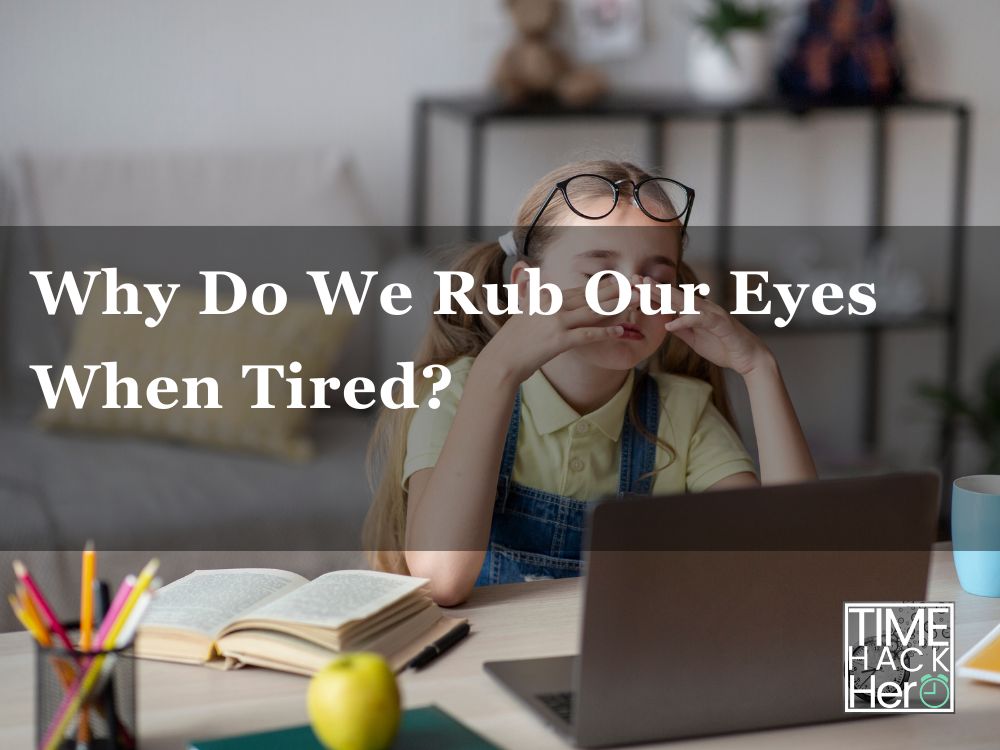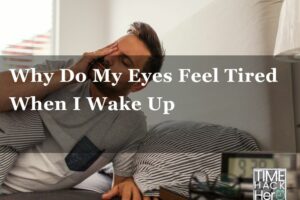It’s the end of a long day and your eyes feel strained and heavy. You rub them trying to relieve the irritation. But instead of feeling better, your eyes end up red, bloodshot and even more tired.
This common impulse to rub your eyes when fatigued is natural but counterproductive. The habit can damage your eyesight and actually make eye irritation worse.
Table of Contents
Is this normal?
Occasionally giving your eyes a light massage is harmless. But chronic and forceful eye rubbing linked to fatigue can cause harm. Understanding why we do it and how to curb the reflex is key to maintaining eye health.
8 Reasons We Rub Our Eyes When Tired
Rubbing your eyes seems to provide temporary relief but tends to aggravate issues over time. Here are explanations why we instinctively rub when overtired:
1. Temporary Comfort
When exhausted, eyes strain. Rubbing offers quick soothing pressure. But it only provides momentary comfort while potentially worsening strain long-term.
2. Stimulate Tear Production
Tired eyes tend to feel dry. Rubbing stimulates tear production to add moisture. But tears may contain inflammatory proteins that irritate eyes more.
3. Itchiness
Ocular allergies can cause itchy eyes when tired. Rubbing seems to curb itching but just spreads irritating allergens around eyes.
4. Reset Vision
Eye muscles fatigue like other muscles. Rubbing resets eye focusing ability, albeit very briefly.
5. Habit
Frequent rubbing can form an unconscious habit. Your brain associates eye strain with rubbing.
6. Self-soothing
The motion may calm mentally like thumb sucking, providing a dopamine hit. But it distracts from resolving root eye fatigue causes.
7. Poor Focus
Blurry vision from strain makes you rub to try sharpening sight. But it usually just worsens focus.
8. Motor Tic
Some obsessive compulsive disorders involve repetitive tics like eye rubbing. Managing the disorder eases need to rub.
The instinct to rub tired eyes is wired into most brains. But recognizing it offers only superficial relief can help you resist the reflex.
The Soothing Effect of Rubbing
Rubbing seems to provide temporary relief from ocular discomfort when tired. Why does it feel good to rub?
Massages the Eyelids
Gently massaging the eyelids with fingertip pressure stimulates lubrication of the meibomian glands along the lash lines. Their oily secretions prevent tear evaporation.
Spreads Tears
The mechanical action of rubbing distributes tears across the eye surface, moistening dry spots and washing away irritants.
Stimulates Tear Production
Rubbing may directly stimulate tear generation from acceleration of blood flow to lacrimal glands. More tears relieve dryness.
Alleviates Muscle Tension
Delicate orbicularis eye muscles around the lids tire from constant focus. Rubbing eases their ache and tension.
Temporarily Realigns Lids
Gentle rubbing can reposition displaced eyelids that may become misaligned from fatigue. This provides temporary comfort.
So although not curative, rubbing offers short-term relief by bathing irritated eyes in fresh tears.
Negative Effects of Rubbing Your Eyes
Rubbing eyes may feel good momentarily. But it can inflict several forms of ocular damage over time including:
- Corneal abrasions – Rubbing scrapes the sensitive corneal surface. Repeated abrasions impair vision.
- Infection – Rubbing can transfer bacteria and viruses from fingers into the eyes.
- Bleeding – Too much pressure can burst delicate eye blood vessels.
- Wrinkles – Vigorous rubbing contributes to wrinkles around the eyes.
- Eye migraine – Rubbing may trigger ocular migraine headaches.
- Dryness – Excessive rubbing worsens dry eye syndrome.
- Vision changes – Habitual rubbing can distort shape of eyeball.
- LASIK complications – It can dislodge protective corneal flaps after this vision correction surgery.
While occasional gentle rubbing poses low risk, chronic vigorous rubbing boosts chances of eye health issues. Finding better ways to manage eye fatigue is beneficial.
Ways to Avoid Rubbing Your Eyes When Tired
Breaking the habit requires identifying triggers and substituting healthy alternatives to rubbing:
Rule out medical causes
If fatigue and irritation persist, see an optometrist to diagnose underlying issues like:
- Refractive errors
- Allergies
- Dry eyes
- Eye strain
Follow professional treatment guidance for such conditions.
Reduce screen time
Digital eye strain exacerbates rubbing from excessive:
- Computer use
- Phone scrolling
- TV viewing
- Gaming
- E-reading
Follow the 20/20/20 rule – every 20 minutes, look away about 20 feet for 20 seconds.
Use proper lighting
Insufficient or harsh lighting stresses eyes whether reading, on-screen or driving.
Position near light sources properly to avoid glare. Keep rooms well lit.
Check your ergonomics
Poor posture and improper workstation setup boosts eye and neck strain.
Organize your desk and seat to optimize comfort and eye health.
Eat a healthy diet
Nutrients like lutein, zeaxanthin and omega-3 aid vision. Caffeine and alcohol dehydrate eyes.
Hydrate
Drink plenty of water. Dehydration aggravates eye dryness and strain.
Sleep more
Insufficient sleep deprives eyes of needed recovery time and lubrication.
Aim for 7-9 hours nightly of quality sleep.
Try eye massage
Gently massage eyelids, temples and around eyes in small circles.
Use warm, clean fingers or devices made for eye massage.
Use eye drops
Over-the-counter drops provide temporary eye hydration and redness relief.
Lubricating and antihistamine drops calm allergies and dryness.
Take breaks
Rest eyes every 20 minutes when driving or viewing screens.
Just close them briefly or gaze out the window.
Stay active
Daily exercise and fresh air help avoid sedentary eye strain.
Reduce stress
Anxiety tenses eyes and body, worsening fatigue strain. Try calming practices like meditation.
Avoid allergy triggers
Control indoor allergens by keeping dust and pet dander down, replacing HVAC air filters regularly.
Wear sunglasses
They protect eyes from sun, wind and irritants outdoors. Good UV blocking lenses also filter bright indoor light.
Keep hands busy
Fidget toys, stress balls or activities divert urge to rub eyes.
See an optometrist annually
Eye exams ensure vision is corrected and screen for problems.
When Eye Rubbing Becomes Problematic
For most people eye rubbing when tired is harmless. But excessive, forceful rubbing can cause issues:
See an eye doctor if you experience:
- Chronic eye redness
- Light sensitivity
- Blurred vision
- Recurrent eye infections
- Frequent styes or chalazia
- Worsening nearsightedness
- Corneal abrasions
- Broken blood vessels on whites of eyes
Seek help for uncontrollable urge to rub eyes as it may signal OCD or related sensory disorders.
With proper eye care, occasional gentle rubbing is fine. But see a doctor if symptoms arise.
Preventing Harmful Eye Rubbing
You can’t always resist rubbing exhausted eyes. But you can take precautions to rub more safely:
- Wash hands first to remove germs
- Rub very gently using light fingertip pressure
- Rub eyes through closed lids when possible
- Use cool compresses instead of rubbing to soothe eyes
- Identify and treat any allergies or eye problems causing frequent rubbing
- Keep fingernails short to avoid corneal scratches
- Avoid rubbing right after inserting contacts
- Stop if rubbing causes pain or worsens redness
- See an optometrist if vision changes from frequent rubbing
Practice eye care habits like blinking more and using artificial tears to prevent an overwhelming urge to rub.
Healthy Alternatives to Rubbing Eyes
When tired eyes cry out for relief, try these healthy alternatives to rubbing:
- Splash face with cool water – Cools, cleanses eyes and wakes you up.
- Hot compress – Moist heat helps unblock oil glands.
- Cool cucumber slices – Soothes irritated eyes.
- Tea bags – Caffeine and tannins reduce swelling.
- Avoid irritants like smoke or chlorine when tired.
- Over-the-counter eye drops – Lubricates and moisturizes.
- Ointments before bed – Heals corneal abrasions.
- Allergy meds – Block histamines that provoke rubbing.
- Warm washcloth compress – Opens oil glands to moisten eyes.
- Close eyes – Blocks out light and rests eyes.
With alternatives like these, you can often calm eyes without risky rubbing.
Conclusion
Rubbing your eyes when overtired is an instinctive yet counterproductive habit. While it may offer superficial temporary relief from eye strain, frequent vigorous rubbing can damage your eyes and worsen irritation overall. Following the 20/20/20 rule for screens, optimizing ergonomics, hydrating, getting sleep, taking breaks, avoiding allergy triggers and keeping hands occupied are healthier ways to manage eye fatigue. But get an annual eye exam to rule out any underlying vision or medical conditions contributing to tired eyes. Breaking the eye rubbing impulse takes awareness and perseverance – but your eyes will thank you.
Frequently Asked Questions
Why do I rub my eyes and make them worse?
You likely rub your eyes seeking relief from strain or dryness. But rubbing can scratch the cornea, spread infection, worsen dryness and damage vision over time. Break the habit and hydrate tired eyes instead.
Why do I rub my eyes so much?
Frequent eye rubbing may be a habit or compulsion. Contributing factors can include untreated vision problems, excessive screen use, lack of sleep, dehydration or allergies. Identifying and managing root causes reduces urge to rub.
How do I stop rubbing my eyes when tired?
To avoid rubbing tired eyes: rest them periodically, use artificial tears, massage around eyes gently, stay hydrated, reduce screen time and sleep more. Keeping hands occupied with activities also helps break the habit.
Why does rubbing eyes feel good?
Rubbing provides temporary relief by exerting pressure on straining muscles, stimulating tear production and resetting focus. But it only feels good momentarily then often makes irritation worse.
Is it OK to rub eyes with contacts?
Try not to rub eyes while wearing contacts because it can displace or damage lenses. But if you must rub gently, first wash hands thoroughly. Opt for daily disposables if rubbing is frequent to avoid infection risk with reused lenses.









